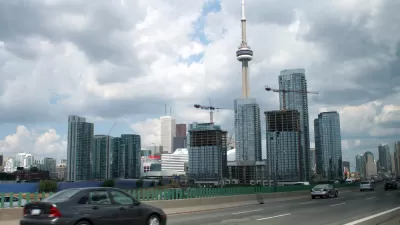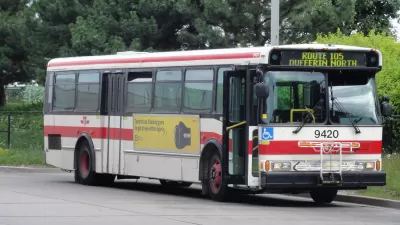More than two years into a 10-year plan, the city has installed only a fraction of planned bike lanes.

Ben Spurr reports on the status of Toronto’s Cycling Network 10 Year Plan, which the city council approved in 2016. Biking advocates say the city is not meeting the milestones needed to keep the plan on track.
The city has completed only about 6 percent of the almost 350 lane miles outlined in the plan. In addition, annual expenditures of the $153.5-million plan have been below target amounts. Last year, for example, investments should have totaled $16 million, but the city only spent $10 million.
City officials acknowledge that the plan is running behind schedule and say more staff is needed. They also say that the planning and implementation process takes time and that bike lane installations are often dependent on other road projects, which can face delays or rescheduling.
Still, bike advocates want to know why the city is not keeping up with a detailed project schedule that was part of the approved plan. In addition, critics say the city needs to prioritize corridor studies to identify bike lane sites on main arterials. "Councillor Joe Cressy, a vocal cycling advocate, said major streets need to be added back into the plan, otherwise the city will be confined to improving cycling routes on less-used residential streets," notes Spurr.
FULL STORY: City’s execution of 10-year bike plan ‘has not delivered on expectations,’ says advocate

Planetizen Federal Action Tracker
A weekly monitor of how Trump’s orders and actions are impacting planners and planning in America.

San Francisco's School District Spent $105M To Build Affordable Housing for Teachers — And That's Just the Beginning
SFUSD joins a growing list of school districts using their land holdings to address housing affordability challenges faced by their own employees.

The Tiny, Adorable $7,000 Car Turning Japan Onto EVs
The single seat Mibot charges from a regular plug as quickly as an iPad, and is about half the price of an average EV.

Seattle's Plan for Adopting Driverless Cars
Equity, safety, accessibility and affordability are front of mind as the city prepares for robotaxis and other autonomous vehicles.

As Trump Phases Out FEMA, Is It Time to Flee the Floodplains?
With less federal funding available for disaster relief efforts, the need to relocate at-risk communities is more urgent than ever.

With Protected Lanes, 460% More People Commute by Bike
For those needing more ammo, more data proving what we already knew is here.
Urban Design for Planners 1: Software Tools
This six-course series explores essential urban design concepts using open source software and equips planners with the tools they need to participate fully in the urban design process.
Planning for Universal Design
Learn the tools for implementing Universal Design in planning regulations.
Smith Gee Studio
City of Charlotte
City of Camden Redevelopment Agency
City of Astoria
Transportation Research & Education Center (TREC) at Portland State University
US High Speed Rail Association
City of Camden Redevelopment Agency
Municipality of Princeton (NJ)





























